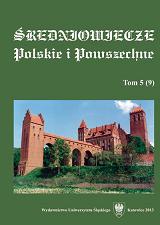Understanding the balance of power in Eastern Iceland. Some remarks on the "Saga of the Men of Svinafell"
Understanding the balance of power in Eastern Iceland. Some remarks on the "Saga of the Men of Svinafell"
Author(s): Grégory CattaneoSubject(s): History
Published by: Wydawnictwo Uniwersytetu Śląskiego
Summary/Abstract: By the end of the 12th century Iceland was a political arena of significant changes. The prevailing system of power, based on the General Assembly (Althing) and local leaders authority (goðar) was coming to an end. The balance of power on the island was then to be based on the coexistence of greater domains (héraðsríkja) which were formed by most influential sagas at the cost of local leaders. By the end of the first half of the 13th century, in the Age of the Sturlungs, Iceland was unofficially divided into six local areas of influence ruled by eminent sagas: Haukdælir in Árnesþing, Oddaverjar in Rangárþing, Ásbirningar in Skagafjörður, Vatnsfirðingar in Ísafjörður, in Sturlungar, in Hvammur, in Dalir, and Svínfellingar in Austfirðir. The process of consolidation of power on the island was characteristic of conflicts between particular sagas. Their course is reflected in the so called contemporary sagas written down under the directive of main and most influential participants of the struggle for power (e.g. the Sturlung Saga). The author of the article reflects on the way in which the rivalry, change of alliances, armed confrontations, reached agreements and armistice all came to influence the political balance in Eastern Iceland. The basis for the research into these mechanisms is the analysis of one of the contemporary sagas, that is the Saga of Men from Svinafell (Svínfellinga saga) as compared with other, predominantly old annual volumes created at that time on the island.
Journal: Średniowiecze Polskie i Powszechne
- Issue Year: 2013
- Issue No: 9
- Page Range: 62-85
- Page Count: 24
- Language: English

